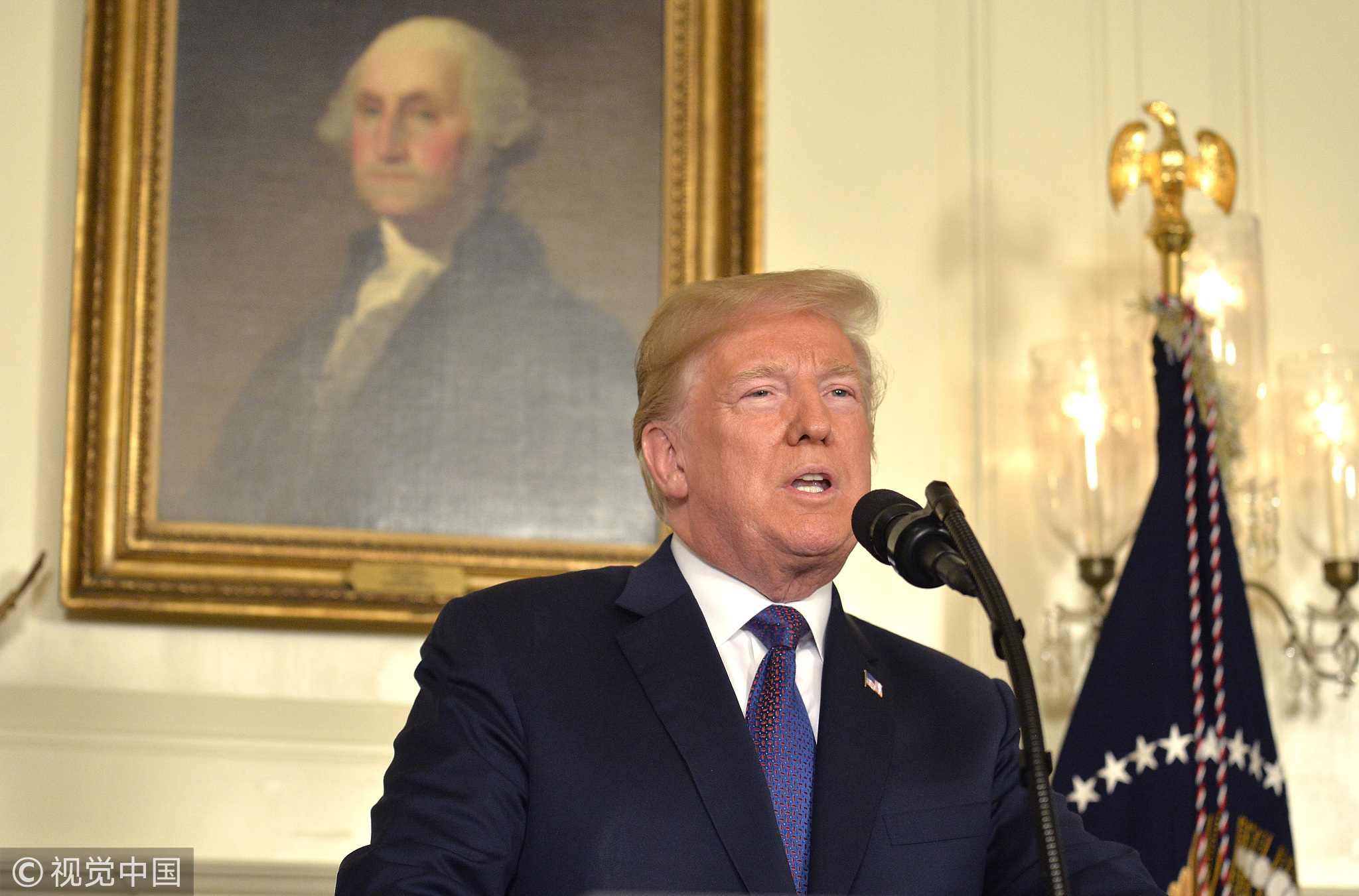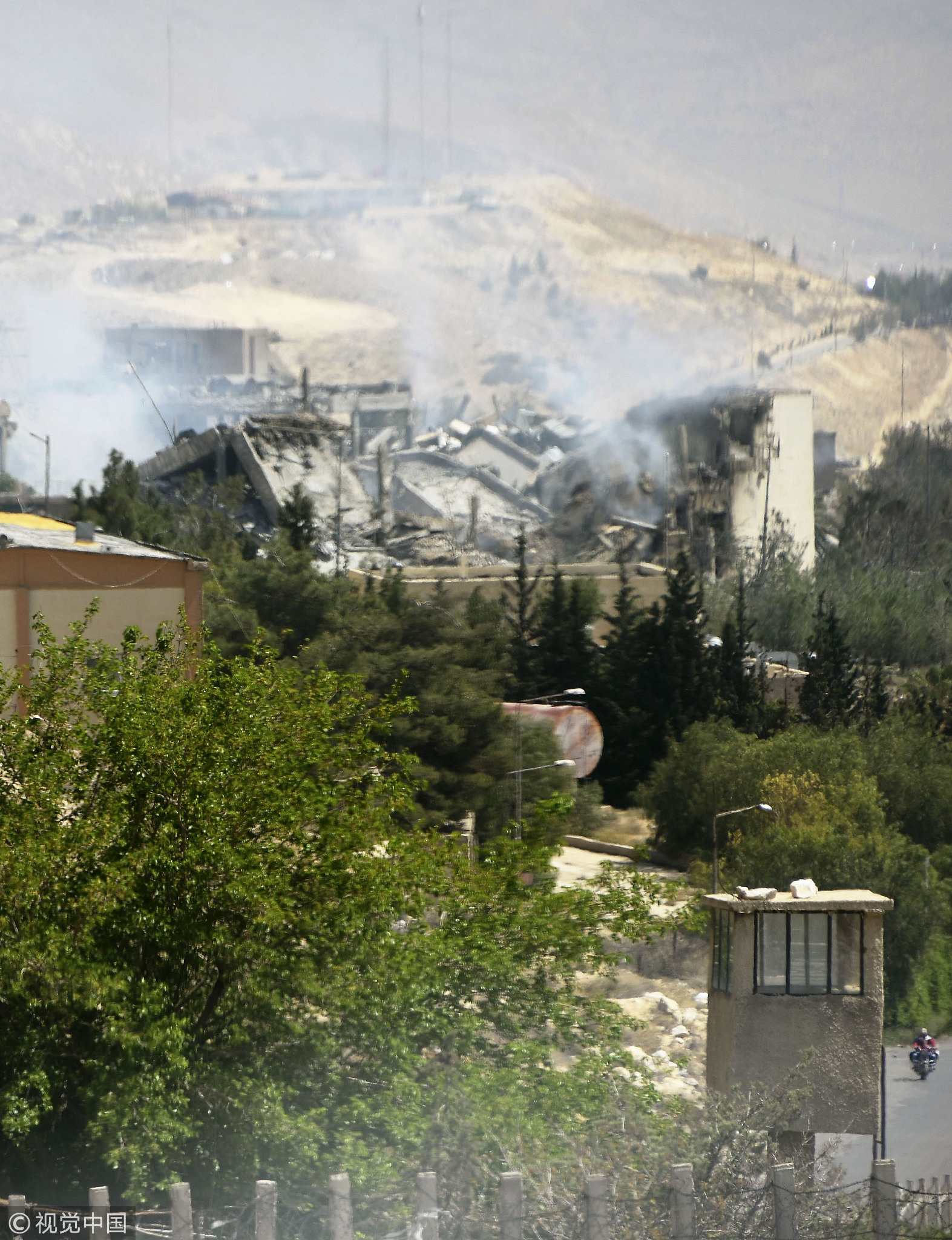
Opinions
20:45, 27-Aug-2018
Opinion: Is Trump wrong in 'punishing' Syria over suspected chemical weapons?
Updated
20:25, 30-Aug-2018
Cui Zheng

Editor's note: Cui Zheng is an associate professor at the Center for the Economies and Politics of Transitional Countries under Liaoning University in China. The article reflects the author’s opinion, and not necessarily the views of CGTN.
On August 22, US National Security adviser John Bolton said that the United States is ready to strike Syrian government forces harder than ever if they use chemical weapons. To this end, the US Navy destroyer “Sullivan” arrived in the Persian Gulf the other day, carrying 56 cruise missiles. Meanwhile, B-1B strategic bombers of the US Air Force carrying 24 ATG “AGM - 158 JASSM” cruise missiles have also been deployed to Al-Udeid Air Base in Qatar.
It seems that another military operation to punish Syrian government forces for their alleged use of chemical weapons is imminent.
But what are the real motives behind the US actions?
Syria and Chemical Weapons
At present, the chemical weapons reported to have been used in the Syrian battlefield are mainly nerve agents, including sarin and VX, with a few reports talking about erosive agents such as mustard gas also being used.

US President Donald Trump speaks to the nation, announcing military action against Syria for an apparent gas attack on its civilians, at the White House, April 13, 2018. /VCG Photo
US President Donald Trump speaks to the nation, announcing military action against Syria for an apparent gas attack on its civilians, at the White House, April 13, 2018. /VCG Photo
In October 2013, Syria officially became a member of the Chemical Weapons Convention (CWC) and cooperated with the United Nations to destroy its stockpile of chemical weapons and production equipment. However, experts say that the chemical weapons destroyed were only those reported by the Syrian government to the Organization for the Prohibition of Chemical Weapons (OPCW) and those verified by the OPCW. They suspect that a small number of chemical weapons were controlled by the opposition or other organizations, which were not made public.
For the United States, Britain, France and other countries, it does not matter whether it was reasonable to use chemical weapons when the Syrian government forces gained an absolute advantage in the war. What matters is that it once again gave the Western forces an excuse to attack the Syrian government forces militarily.
Why Trump wants to attack Syria
In April, when US President Donald Trump tweeted "Mission Accomplished," many political pundits quickly drew a parallel with George W. Bush's infamous speech after the 2003 Iraq war. Yes, it was the septuagenarian leader's swift reaction to the US air strikes on Syria over its suspected use of chemical weapons.
Trump claims that another intense attack on Syria will prevent the West from being dragged into the war. However, the most stunning part of it remains the absence of any solid evidence to establish that Assad's government has anything to do with chemical weapons.
So, why does Trump want to attack Syria? The answer to this simple question might lie in the fact that Trump's US has no obvious strategy for Syria.
The punitive US attacks on Syria are part of America's peculiar style of flexing its muscles in the region, especially amidst an emerging Russia-Iran-Syria axis. What's even more interesting is that while many Western powers believe that Assad should be punished for his so-called "brutality" during the war, none has vowed to contribute to the reconstruction of Syria while he remains in power.
The US does not want countries to have good relations with Russia

Smoke rises from a scientific research facility in Barzeh, a suburb of Damascus, following US-led strikes against Syrian President Bashar al-Assad's government, Apr. 14, 2018. /VCG Photo
Smoke rises from a scientific research facility in Barzeh, a suburb of Damascus, following US-led strikes against Syrian President Bashar al-Assad's government, Apr. 14, 2018. /VCG Photo
US-Turkey relations have been pushed to a new low due to US economic sanctions against Turkey. As a NATO ally with the US, Turkey interacts frequently with Russia. American interference appears have led to the formation of a temporary alliance between Russia, Turkey and Iran over the Syrian issue.
Much to the concern of the US, the August 18 bilateral talks between Russian President Vladimir Putin and German Chancellor Angela Merkel showed that relations between the two states were moving towards normalization.
None of this is acceptable to America.
America’s stronger attacks on Syria are a warning to an increasingly unruly Germany and Turkey as well as military pressure on Russia and Iran.
Trump avoids appearance of “collusion” with Russia
Trump's performance at a summit with Putin in Helsinki in mid-July was criticized by the domestic establishment and the media. There was the possibility that the successive US sanctions against Russia introduced since August was not Trump’s intention.
The purpose of this initiative for military action on Syria was to show America's strength to Syria supporter, Russia, and it would be helpful to release the pressure of Trump’s “collusion with Russia” accusation.
In addition, on August 21, former Trump election campaign chairman Paul Manafort and former personal lawyer Mike Cohen went on trial.
Although neither of them has provided direct evidence for the probe of special prosecutor Mueller's “Russiagate,” the guilty plea by a former aide would again undermine Trump's authority and even increase the risk of him being impeached. Syria was once again a victim.
Midterms: Votes matter
Donald Trump has been often termed as a president in a perpetual "campaign mode."
The US strikes on the Al-Schairat Air Base in Syria were hugely appreciated domestically with a whopping 57-percent approval rating; even Trump's own approval rating soared. As the US goes to the ballot in November, exploiting all opportunities to sweep the midterms is certainly Trump's top concern.

SITEMAP
Copyright © 2018 CGTN. Beijing ICP prepared NO.16065310-3
Copyright © 2018 CGTN. Beijing ICP prepared NO.16065310-3